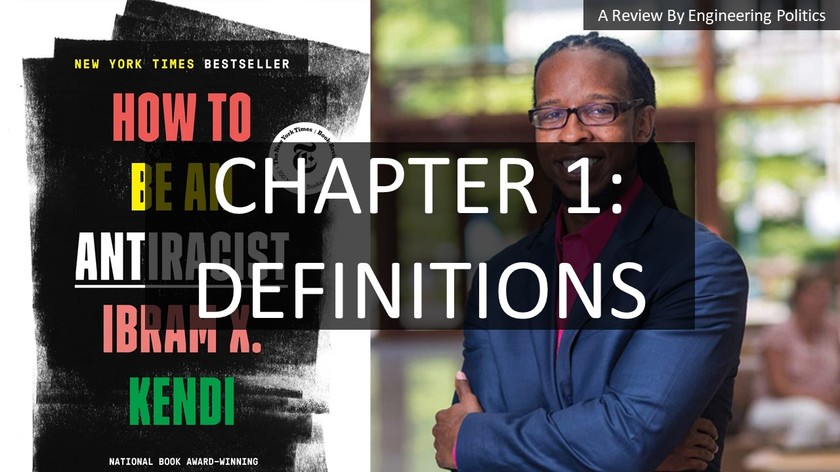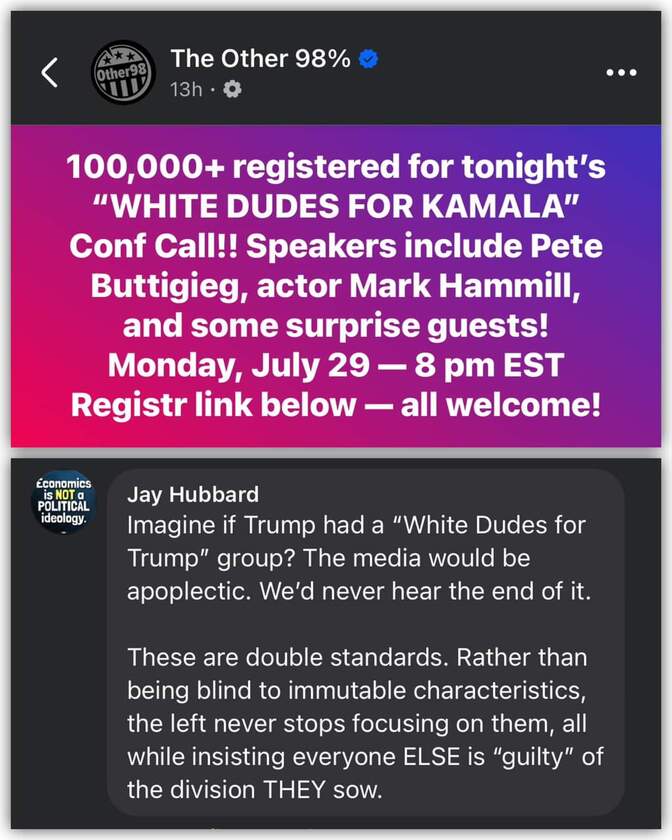
So, just like the title of the chapter implies, Kendi starts out with a few definitions. He does this at the beginning of every chapter, except he will redefine words to better fit the context of the chapter. Even though a single word can have multiple definitions, this already raises a red flag for me. To quote the great Thomas Sowell, “You can make any claim true if you change the definition of just one word.” This type of deception is used early and often in this book, but that isn’t something we haven’t come to expect from writers of critical theory. The two terms up for definition in this chapter is Racist and Antiracist.
“RACIST: One who is supporting a racist policy through their actions or inaction or expressing a racist idea. ANTIRACIST: One who is supporting an antiracist policy through their actions or expressing an antiracist idea.”
So already I have a problem with these definitions, other than the obvious inaction claim. Maybe I’m just a bit OCD or I’ve had good English teachers in the past, but you aren’t supposed to have the defining word in the definition of that word. That creates circular logic, although, I imagine Kendi didn’t do this out of ignorance. Let’s continue with a few bits and pieces from the chapter that build the framework for the claims he will make.
“[T]he key for both of us was defining our terms so that we could begin to describe the world and our place in it. Definitions anchor us in principle.”
“To be antiracist is to set lucid definitions of racism/antiracism, racist/antiracist policies, racist/antiracist ideas, racist/antiracist people.”
“Racial inequity is when two or more racial groups are not standing on approximately equal footing.”
“Racial equity is when two or more racial groups are standing on a relatively equal footing.”
What we have so far are not things I necessarily disagree with. I certainly believe “definitions anchor us in principle” but can also create a new narrative if we redefine words, which is something critical theorists are very fond of. The racist and antiracist binary is not something I would stand by, but that is something we will get to later. The big one here is the word equity. Race theories, and the progressive Left more generally, have swapped out the term equality for equity to make their claims closer to the truth, but this also causes their claims to lose value. Equality is treating everyone fairly, and equity typically refers to equal or proportionate outcomes. We all want equality but we know we should not force equality of outcome. The rebranding of equality to equity is a magician’s trick on those not paying close enough attention to see the slight of hand. But when it comes to strictly analyzing Kendi’s last two quotes by using their objective definitions, he isn’t wrong. He will rely on the reader’s inability to know they are at a magic show in order to build the narrative for the rest of the chapter. I will continue by listed several quotes that get to the meat of Kendi’s message in this chapter.
“There is no such thing as a nonracist or race-neutral policy. Every policy in every institution in every community in every nation is producing or sustaining either racial inequity or equity between racial groups.”
“Racial discrimination is an immediate and visible manifestation of an underlying racial policy. When someone discriminates against a person in a racial group, they are carrying out a policy or taking advantage of the lack of a protective policy.”
“But if racial discrimination is defined as treating, considering, or making a distinction in favor or against an individual based on that person’s race, then racial discrimination in not inherently racist. The defining question is whether the discrimination is creating equity or inequity. If discrimination is creating equity, then it is antiracist. If discrimination is creating inequity, then it is racist.”
“The only remedy to racist discrimination is antiracist discrimination. The only remedy to past discrimination is present discrimination. The only remedy to present discrimination is future discrimination.”
“Do-nothing climate policy is racist policy, since the predominantly non-White global south is being victimized by climate change more than the Whiter global north, even as the Whiter global north is contributing more to its acceleration.”
Wow. When I got to these sections in the chapter, I literally started to talk to the book to tell it how awful it was acting. I don’t think I will have to elaborate much here. It may seem like some of these quotes could be taken out of context, but I assure you, the context Kendi gives around these quotes only make them worse. Here is where we begin to see behind the curtain. You are either with us or against us. There is racism or antiracism inside of every move you make, you just need to take the time to find it. The advocation for blatant discrimination made by Kendi is one of the most insane claims I’ve ever heard or read, and to me, fits the “2 plus 2 makes 5” type of ideological brainwashing needed for the foundation of critical race theory or any critical theory. Racism has nothing to do with the intentions of the possible racist or antiracist individual but can only be defined by the end racist or antiracist results as dictated by proportional equity. With this reasoning, the NFL, NBA, and NHL are all very racist organizations (I’m pretty sure the ‘N’ in all these leagues stands for ‘nationalist’). This is also why climate change is now a major policy objective for Black Lives Matter, because it’s racist obviously. Kendi has now built a narrative that can’t be disproven. If you reject the preconditions to the narrative, you are now a racist. Here are a few other quotes that sum up the message in this chapter.
“The most threatening racist movement is not the alt right’s unlikely drive for a White ethnostate but the regular American’s drive for a ‘race-neutral’ one.”
“But there is no such thing as a not-racist idea, only racist ideas and antiracist ideas.”
“There may be no more consequential White privilege than life itself.”
Here Kendi does what many progressive Left ideologs do today, he targets the non-political and people who would consider themselves allies who aren’t antiracist enough. It isn’t the openly racist or nationalists who are the worst racists, it’s the store clerk who helps the white patron before the black patron because he clearly thinks the white patron should receive faster and better service. It’s also the store clerk who helps the black patron before the white patron because he clearly wants the black patron to leave his store quicker. Either option that isn’t explicitly antiracist is to be considered racist. And the final quote by Kendi takes the cake. The greatest white privilege is life itself. Kendi explains how “White lives matter to the tune of 3.5 additional years over Black lives in the United States” should be considered racist. He lists disparities in infant mortality, cancer survival rates, but conveniently never touched on death caused by black-on-black crime or obesity rates. The paragraph preceding this white privilege claim, and I’m not kidding, was about how his grandmother died because she left the oven on and feel asleep. Because his grandmother had Alzheimer’s, which is more prevalent among African Americans, the implication is racism killed her. Now although this is a tragic story, this is one of the most evil uses of tragedy I’ve ever witnessed, but this is the type of dishonesty I’ve sadly come to expect from someone like Kendi, a true racist.
Thanks for reading my rant style review of the first chapter of How to be an Antiracist by Ibram X. Kendi. Please let me know if you find this useful. My goal here is to explain each chapter enough and in a somewhat objective way so others don’t waste their time and money on investigating this material themselves. I know this kind of goes against the logic of investigation where you want to read the source material yourself and build your own conclusions, but this is a very shallow read that does not strain the mind, in any positive way at least, like any proper academic book should. Please leave a comment with your thoughts.
Thanks for being a part of the Engineering Politics Locals Community!

I was listening to some news updates when I heard this CNN clip about the potentially hazardous water in East Palestine, and as soon as I heard her ask the question about whether or not her guest would drink the water, I IMMEDIATELY thought of this clip from South Park. Enjoy.
In this special episode of The Engineering Politics Podcast, Truman from Return To Reason is back for a new video and podcast series titled ‘Revisiting The Road To Serfdom’ where we review F.A. Hayek’s classic work, The Road To Serfdom. This episode covers ‘Chapter 15: The Prospects of International Order’.
This will be an ongoing series that covers the entire book. We put a ton of work into making this insightful and relevant, so we hope you enjoy watching/listening as much as we enjoyed reading and recording.
Become a subscriber of the Engineering Politics Locals Community to support this content. Also, consider joining the @ReturnToReason Locals Community to show Truman some support.
In this episode of The Engineering Politics Podcast, I team up with Truman from @ReturnToReason to interview one of the most intelligent and influential creators in the space of philosophy today. Stephen R.C. Hicks is a Professor of Philosophy at Rockford University, Executive Director of the Center for Ethics and Entrepreneurship, and Senior Scholar at The Atlas Society. He has written many books including Explaining Postmodernism and Nietzsche and the Nazis. We bring him on to talk about the social and political issues we are currently facing in America, and the West more broadly, and what the collectivist ideas of Jean-Jacques Rousseau might have to do with it.
Become a subscriber of the Engineering Politics Locals Community to support this content. Also, consider joining the @ReturnToReason Locals Community to show Truman some support.
In this special episode of The Engineering Politics Podcast, Truman from Return To Reason is back for a new video and podcast series titled ‘Revisiting The Road To Serfdom’ where we review F.A. Hayek’s classic work, The Road To Serfdom. This episode covers ‘Chapter 15: The Prospects of International Order’.
This will be an ongoing series that covers the entire book. We put a ton of work into making this insightful and relevant, so we hope you enjoy watching/listening as much as we enjoyed reading and recording.
Become a subscriber of the Engineering Politics Locals Community to support this content. Also, consider joining the @ReturnToReason Locals Community to show Truman some support.
In this episode of The Engineering Politics Podcast, I team up with Truman from @ReturnToReason to interview one of the most intelligent and influential creators in the space of philosophy today. Stephen R.C. Hicks is a Professor of Philosophy at Rockford University, Executive Director of the Center for Ethics and Entrepreneurship, and Senior Scholar at The Atlas Society. He has written many books including Explaining Postmodernism and Nietzsche and the Nazis. We bring him on to talk about the social and political issues we are currently facing in America, and the West more broadly, and what the collectivist ideas of Jean-Jacques Rousseau might have to do with it.
Become a subscriber of the Engineering Politics Locals Community to support this content. Also, consider joining the @ReturnToReason Locals Community to show Truman some support.
In this special episode of The Engineering Politics Podcast, Truman from @ReturnToReason is back for a new video and podcast series titled ‘Revisiting The Road To Serfdom’ where we review F.A. Hayek’s classic work, The Road To Serfdom. This episode covers ‘Chapter 14: Material Conditions and Ideal Ends’.
This will be an ongoing series that covers the entire book. We put a ton of work into making this insightful and relevant, so we hope you enjoy watching/listening as much as we enjoyed reading and recording.
Become a subscriber of the Engineering Politics Locals Community to support this content. Also, consider joining the @ReturnToReason Locals Community to show Truman some support.














